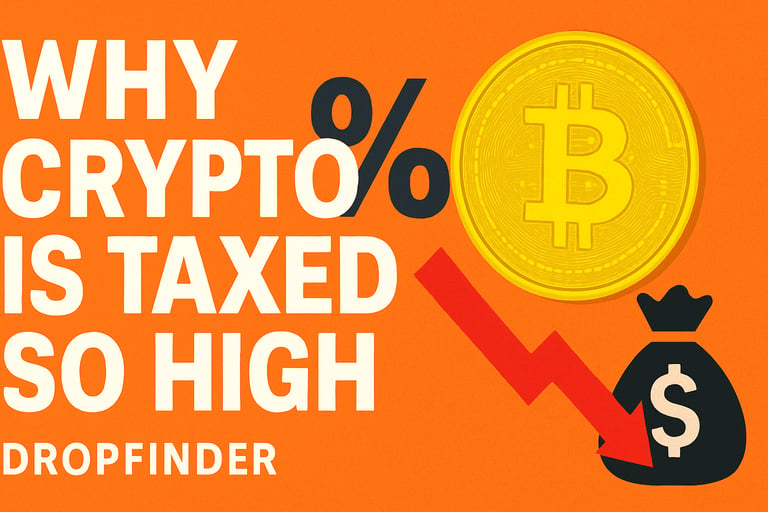Why Crypto Is Taxed So High — DropFinder’s Deep Dive
Explore the key reasons behind steep cryptocurrency taxation globally. DropFinder breaks down how governments determine crypto tax, what drives high tax rates, how regulation & enforcement affect taxes, and what strategies investors use (legally) to reduce the burden.
CRYPTO NEWS
10/7/20253 min read
Why Crypto Is Taxed So High — DropFinder’s Deep Dive
Introduction
Crypto taxation is a hot-button issue. For many investors, the gains from cryptocurrencies are exciting — until tax time hits. With high rates, confusing rules, and shifting regs, crypto taxes often feel like a burden. This blog looks into why crypto tends to be taxed so heavily in 2026, what factors drive those outcomes, and what responsible strategies exist to optimize tax burden.
Key Drivers Behind High Crypto Taxes
1. Governments Seeing Revenue Potential
When crypto adoption booms, governments see an opportunity: capital gains, trading profits, staking rewards, interest—these are all taxable events. As crypto becomes more mainstream, it's a new tax base.
Rising numbers of crypto users → higher potential tax income.
Governments wanting to cover budget deficits or debts often turn to hot, growing sectors for revenue.
2. Classification as Property / Capital Asset
Many tax authorities treat crypto like property or capital assets rather than currency. This means:
Gains from selling, trading or disposing are taxed similarly to stocks or real estate.
Each disposal event (selling, trading, converting to fiat) may trigger a taxable event.
Losses might be usable to offset gains, but record-keeping is complex.
Because property/capital asset tax rates are often higher or involve more compliance, this increases effective tax.
3. Complexity & Compliance Costs
Because crypto is traded across borders, on numerous platforms, and sometimes anonymously, tax authorities impose heavy compliance measures:
Tracking cost basis (when you bought, how much you paid) is complex if you moved assets between wallets, used DeFi protocols, etc.
Exchanges are required to provide transaction reports; authorities want granular data.
Penalties for non-compliance can be harsh, so authorities design laws to capture as much as possible.
These compliance burdens often translate into higher effective tax or more withholding.
4. Transaction & Conversion Taxation
Crypto taxation often hits multiple points:
When you convert crypto → fiat
When you trade one crypto for another
When you use crypto to buy something
Each of these may be separately taxable in many jurisdictions. Taxing each event adds up quickly.
5. High Rates & Withholding Mechanisms
Some jurisdictions impose high nominal rates on crypto gains, sometimes comparable to or exceeding income tax rates. Also:
Some rules treat crypto income (from staking/yield) like regular income, taxed at income-tax rates rather than capital-gains-preferred rates.
Withholding tax or “tax deducted at source” may apply on trades or transactions, reducing net returns.
6. Regulatory & Risk Policy
High taxation helps authorities discourage money laundering, tax evasion, and unreported transactions. Governments want to monitor crypto flows, and taxing at multiple points gives more control.
Also, crypto volatility means governments may tax more heavily to buffer risk of speculative bubbles.
How Different Jurisdictions Handle It
Countries like India tax crypto gains at around 30% plus additional transaction/source taxes, plus TDS.
In the EU under MiCA regimes, crypto is taxed as capital gains / income depending on how it's used (e.g. trading, payments, utility, etc.).
The USA treats crypto as property — each sale or trade may trigger capital gains or loss calculation. Also, crypto income (mining, staking) taxed as ordinary income.
Other countries differentiate: some offer reduced rates for long-term holdings; others impose VAT or sales tax on crypto transactions or use.
Effects of High Crypto Taxes
Can discourage frequent trading or small profit-taking.
May lead to tax avoidance strategies (some legal, some risky).
Push some activity into unregulated or informal channels.
Affect investment decisions: long-term holding vs short-term speculation.
Legal Strategies to Optimize Crypto Tax Burden
Holding long-term — in jurisdictions with lower long-term capital gains vs short-term rates.
Using tax-advantaged accounts (where available) — some countries allow investing via retirement or savings accounts with favorable tax treatment.
Offset losses — keep track of loss events to reduce taxable gains in later years.
Location arbitrage — relocating to or using residence in lower-tax jurisdictions (if feasible).
Use of trusts or entities — depending on law, holding crypto via legal entities can offer deductions, deferments, or favorable tax treatment.
Risks & Caveats
Laws change frequently — what’s legal or low-tax now may change.
Aggressive tax planning can become illegal tax evasion.
Keeping poor records can lead to audits and penalties.
Cross-border taxation issues: double taxation treaties, residence vs citizenship matters.
Final Thoughts
High crypto taxation is driven by governments' need for revenue, the classification of crypto as property/income, regulatory risk, and the desire for compliance/transaction transparency. For investors, it means careful planning, good record-keeping, and staying aware of changing laws.
DropFinder’s advice: treat taxes not as an afterthought but as part of your strategy. The more you understand the “why” behind high crypto taxes, the better you can legally optimize them.
If you like, I can also prepare a comparison chart of tax rates by country, or a visual infographic for this topic.




